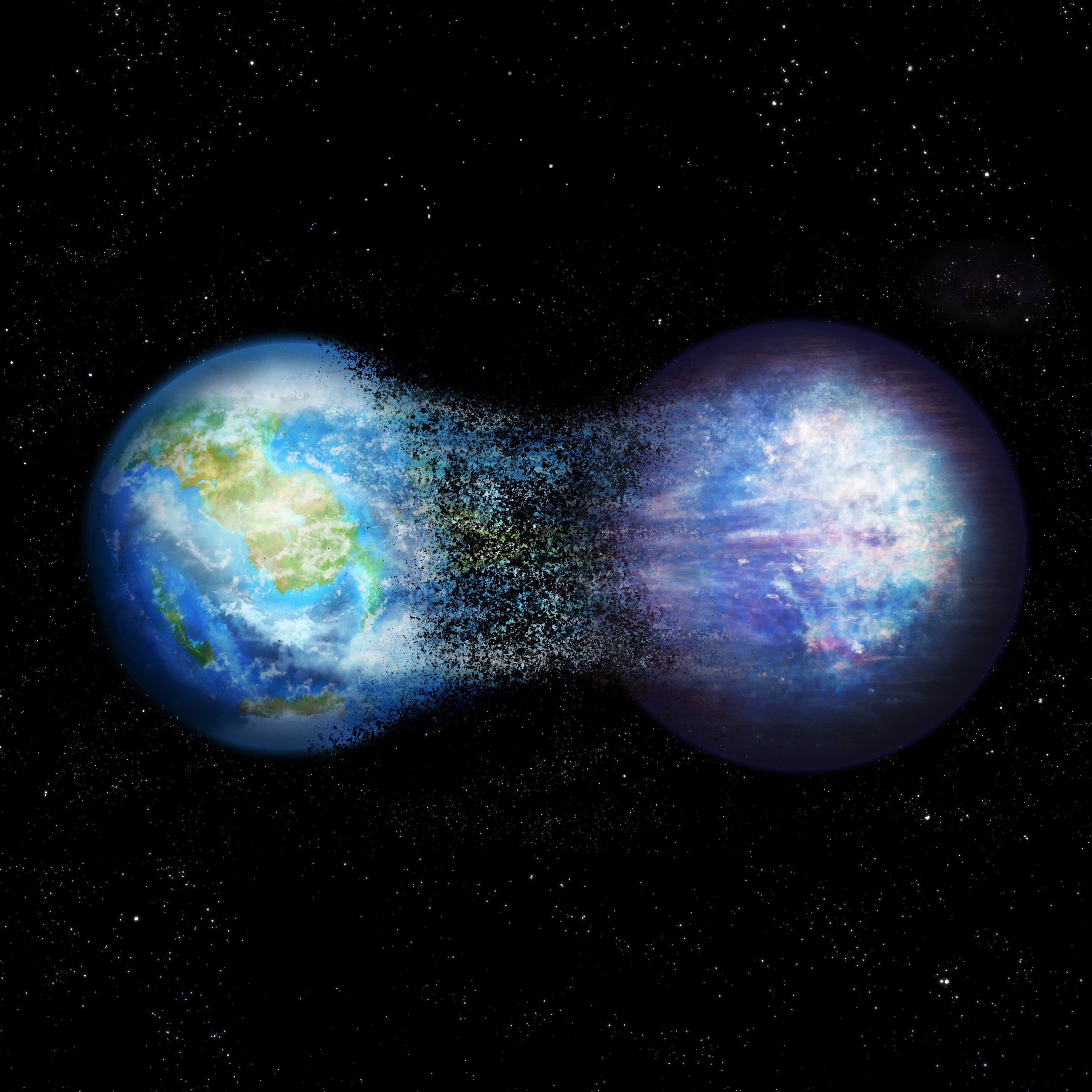The Earth is a wonderful blue and green dot covered with oceans and life, while Venus is a yellowish sterile sphere that is not only inhospitable but also sterile. However, the difference between the two is only a few degrees in temperature. A team of astronomers from the University of Geneva (UNIGE), with the support of the CNRS laboratories of Paris and Bordeaux, has achieved a world’s first by managing to simulate the entirety of the runaway greenhouse process that can transform the climate of a planet from idyllic and perfect for life, to a place more than harsh and hostile.
The scientists have also demonstrated that from initial stages of the process, the atmospheric structure and cloud coverage undergo significant changes, leading to an almost-unstoppable and very complicated to reverse runaway greenhouse effect. On Earth, a global average temperature rise of just a few tens of degrees, subsequent to a slight rise of the sun’s luminosity, would be sufficient to initiate this phenomenon and to make our planet inhabitable. These results are published in Astronomy & Astrophysics.
Venus is a yellowish sterile sphere that is not only inhospitable but also sterile.
What genius of a bot wrote this.
Venus is urine, confirmed
You can drink Venus, it’s totally sterile and safe.
The main thing that stabilizes the environment on Earth is that its 70% is covered in water. Water has a high heat capacity, is an efficient medium of convection, and a high heat of vaporization. The Earth has been much hotter in the past than anthropogenic climate change can cause. It’s not the Earth’s survival at stake, it’s ours.
Important to emphasize:
a global average temperature rise of just a few tens of degrees
This is not something that’s possible through the sort of climate change we’re currently facing. There simply aren’t enough things to burn on Earth to get that sort of a temperature change to happen. This article is talking about the sorts of changes we’ll see as the Sun gradually continues getting brighter over the course of hundreds of millions of years.
I thought the global average temperature already had risen with more than that!
Nope. Much, much less than that. It’s gone up by about a single degree in the past few centuries. This article has temperature estimates going back about half a billion years and it’s never been more than about 14 degrees above average - and one of those periods of high heat was a period called the “middle Eocene climatic optimum” because the biosphere was doing incredibly well overall under those conditions.
Anthropogenic climate change could cause our civilization a lot of grief by forcing billions of people to migrate or starve, but it’s pretty trivial on a geologic scale.
Just finishing up reading Neal Stephenson’s Seveneves, overall people have no concept about just how fragile our existence here on Earth is, and far too many take it for granted.
Yeah, but God made a rainbow after the flood promising he wouldn’t wipe everyone out again therefore it must actually be impossible for us to destroy our ecosystem. /s
Even if you actually believe the Bible he only said he wouldn’t flood the earth again, he never said he wouldn’t kill everyone again.
Plus most biblical literalists acknowledge climate change is happening, now. They’ve just shifted the goal posts to “but it’s because the end times so we can’t/shouldn’t do anything about it.”
deleted by creator
Seveneves was sheer fantasy, though. The Moon up and exploded for no reason to set up the scenario in that book, that’s in no way a situation that we need to consider when pondering the “fragility” of our existence on Earth. The Moon isn’t going to explode.
There are a lot of other points of disaster addressed in Seveneves, yes the main catastrophe is the moon, but Stephenson goes into a lot about the fragility of man, as well as how the interaction between atmosphere, climate, and the edge of space, plus how everything is impacted by the world’s temperature being raised. Stephenson is not the type of writer who stops at “oh this is just what happens if the moon broke” he goes into many other lines of thought both probable and theoretical to fully paint the picture he’s trying to paint for us.
Also who knows what will happen to the moon? We could fuck it up by trying to mine the moon like in the most modern movie version of Jules Verne’s Time Machine, or any of the various other possibilities that could happen from the randomness of our chaotic universe.
Lastly you say “the moon exploded for no reason” but there was definitely a reason, Stephenson acknowledged that there was a reason in the form of Doc DuBoise’s thoughts on the “agent”, but the characters knew that the why and how didn’t matter anymore, because it was all about the “what do we do about it?” Because that was infinitely more important, especially when there was only two years until the hard rain scenario begins, survival was all that mattered, and so the agent and it’s possible causes ceased to matter.
Also who knows what will happen to the moon?
We know that it’s not going to abruptly explode. That’s what I mean by “no reason” - there was no realistic basis for it to happen other than that Stephenson needed it to explode so that the story could happen.
When you say “overall people have no concept about just how fragile our existence here on Earth is” that’s actually true, and it’s true because people get their concept of how fragile our existence is from wildly inaccurate and implausible works of fiction.
I’m sorry if I’m harping on this, but I so often see serious discussions about what we should or should not do in the real world where people pop in with “didn’t you see Terminator?” Or “didn’t you see Snowpiercer?” As if those works of fiction had even the remotest useful basis on which to be forming real-world opinions. One might as well advocate for the death penalty because it’s the only way to stop that awful Mr. Joker from repeatedly committing mass murders in Gotham, or argue that Earth is incredibly robust because it survived all those devastating attacks by the aliens from Independence Day and Independence Day II while remaining habitable. These are perfectly fine works of fiction to go enjoy for fun but they’re a very bad basis for deciding actual real world policy.
First of all the moon didn’t abruptly explode, it cracked open like an egg and shattered, do rocks not crack? Do asteroids not fracture? Also if the moon had exploded there wouldn’t have been two years to prepare as an explosion would have sent impactors almost immediately. You’re hung up on the notion of it “exploding” while there are more realistic scenarios for exactly what happened in the book, this is part of why Stephenson left the “agent” as a mysterious event rather than making the effort to explain away the whys and hows of it happening.
I disagree, there is plenty of science behind the book, so just saying “it’s just fiction” is literally ignoring all of the science that came into being while being influenced by works of fiction. Also my point is yes i agree we understand our own existences are fragile, but I’m taking a higher perspective, people generally don’t understand that a random occurrence from the sun or the void can end life on this planet completely, i mean look at how many people are failing at understanding climate change or all of the misunderstanding of many of the other known disaster scenarios. There’s people who still freaking believe that the Earth is flat and/or that an imaginary sky daddy manipulates daily events in their lives.
Bro you are definitely harping on this, and the genre of Seveneves and that Stephenson often writes within is literally called Speculative fiction, when it comes to science fiction speculative fiction takes an improbable event, such as the “agent”, and then the authors use science or fictional technology to weave their story around the hows and the whys. Also if fiction has no basis in reality then tell me why the Pentagon literally has plans drawn up around alien invasion, zombies, and every other “doomsday” scenario you can imagine?
Risk assessment - a systematic process of evaluating the potential risks that may be involved in a projected activity or undertaking.
Risk assessment is what the Pentagon is doing when they game plan for ridiculous scenarios, risk assessment is figuring out what risk is probable while also considering the improbable, and science fiction writers tend to do similar while writing their stories, especially the ones like Stephenson or Asimov or Clarke, or Sagan, who have the education and do the diligent research behind their concepts, it’s also why guys like Asimov, Clarke, Stephenson, and others in Sci-fi tend to be invited to work with entities like NASA or private ventures like Blue Origin, dating all of the way back to the days when Asimov was alive and actively creating.
Just remember a lot of science and engineering stems from creativity and imagination, fiction and reality go hand in hand at times.
I’m sorry, but no, there simply isn’t any realistic way for what happened in that book to actually happen regardless of what specific word you want to use to describe it. The Moon was dispersed into a ring of debris. That doesn’t just happen because it “cracked” - bodies like the Moon are full of cracks anyway, they crack all the time. They don’t just fall apart. In order to disperse the pieces you need to apply energy to lift them out of the Moon’s gravity well. The amount of energy required to lift every part of an object out of its gravitation is called the gravitational binding energy of the body, The Moon’s gravitational binding energy is 1.2 x 10^29 joules of energy[1](https://www.universetoday.com/121421/how-could-we-destroy-the-moon/) , which is equivalent to about 15 minutes of the total energy output of the Sun. This is a truly immense amount of energy. Where did it come from and how was it applied to the Moon’s material in such a way as to disperse it?
Stephenson didn’t specify because there is no realistic event that could do this, and because as you say he didn’t need to explain it. He was writing a book about the aftermath of the event and so just handwaved that it happened so that the book could proceed. It’s a common rule of thumb in science fiction that every work can have one “free” unrealistic element in it that the reader will simply suspend their disbelief over, provided the rest of the story deals with that element in a realistic manner - for example, the existence of faster than light travel, or teleportation, or in the case of Seveneves the Moon suddenly going kablooie.
As I said, yes, I’m harping on this. I understand and I accept this. The reason I’m doing is is because it is a prime example of the underlying problem I’m trying to point out here - you’re making an argument about how the real world Earth is “fragile” based on a completely unrealistic and fictional scenario you read about. This sort of reasoning comes up all the time. People argue against the real-world use of technologies because they saw some scary movie in which that technology “ran amuck”, when the only real reason the technology “ran amuck” was because the movie’s writer wanted to sell tickets. This is a major fallacy and I try to address it when I see it in the vain hope that maybe it’ll become slightly less common in the future.
You say “people generally don’t understand that a random occurrence from the sun or the void can end life on this planet completely.” This shows a lack of understanding of probability. None of those “random occurrences” are remotely likely to happen. Circling back to the actual topic of the thread, the article discusses what might happen if Earth’s temperature was to raise by “tens of degrees.” As I commented elsewhere in the thread, there’s simply no way for that to actually happen until the Sun itself naturally warms up hundreds of millions of years from now. So Earth is not “fragile” because of it.
[1] ↩︎
Oh okay i get it, you’re just talking to hear yourself talk, or whatever, okay have fun circle jerking with yourself.










